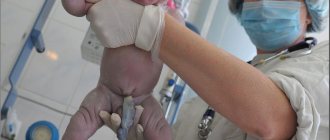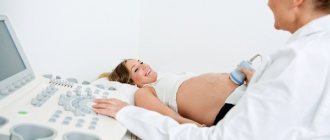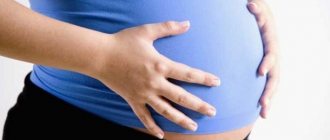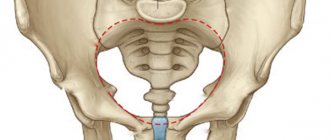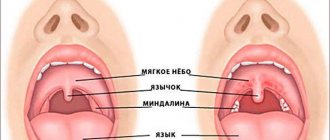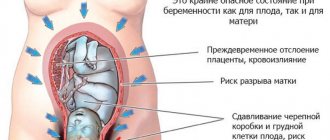Pain in the ligaments of the lower abdomen during pregnancy
Pregnancy provokes serious changes in all systems and organs of a woman. In the first months, the body tries to adapt to the new state. As the embryo increases in size, pain may occur in the ligaments in the lower abdomen. This phenomenon is common. To exclude pathology, it is recommended to consult a doctor and undergo an examination.
Possible reasons and why it is dangerous
The causes of pain in the ligaments in the lower abdomen in a pregnant woman are physiological and pathological . The reasons for the first category include:
- Stretching of the muscle layer and ligaments of the uterus under the influence of an increase in the size of the fetus.
- Changes in the center of gravity and balance of the body due to the growth of the abdomen.
- Hypertonicity of the muscular corset of the pelvis and back.
- Excessive load on the spine due to severe weight gain, changes in gait and posture.
Pathological causes of ligament pain include:
- Varicose veins of the genital area or extremities.
- Deficiency or excess of vitamins.
- Imbalance of minerals in the body.
- Pathologies of arteries, heart.
- Vascular atherosclerosis.
- Osteochondrosis.
- Appendicitis.
- Ovarian cyst.
- Umbilical, inguinal hernia.
- Infectious lesion of ligaments.
- History of fibromyalgia.
- Pyelonephritis.
- Genital herpes.
Why does the stomach feel tight in the early stages of pregnancy?
How can you determine that a new life has arisen within you? And, if the usual menstruation does not come on the right day and the lower abdomen hurts, is this a sign of pregnancy?
So, the new menstrual cycle is nearing completion and you are looking forward to the “news” about the desired conception.
Of course, pregnancy, its initiation and course is a purely individual process and can take place in different ways. But there are still basic similar signs, and one of them is a “pulling” pain in the lower abdomen.
- The process of fusion of female and male eggs occurs during the period of ovulation, which, as a rule, occurs in the middle of the cycle;
- A few days (usually from 6 to 12) after fertilization, the egg reaches the uterus, passing through the fallopian tubes;
- In the wall of the female reproductive organ, she finds a “cozy place” and is fixed in it;
- At the same time, the fertilized cell seems to “push apart” the epithelial cells in order to settle better;
- The implantation process causes the first signs of pregnancy, in which the lower abdomen hurts and scanty bleeding appears;
- Most often, “population” of the egg occurs towards the end of the cycle, when there are only a few days left before menstruation.
Therefore, aching or nagging pain in the lower abdomen means either the successful consolidation of the zygote, or the approaching menstruation (if fertilization has not occurred).
Interesting! Nagging pain (moderate) in the suprapubic area often means the fact that the female body has accepted the unborn baby. All organs and systems “launch” the necessary processes and are ready to help the full growth and development of the baby.
Determining whether pregnancy has occurred is quite difficult. Often a woman perceives such sensations as harbingers of menstruation.
If implantation was accompanied by spotting bleeding, most often the verdict is the same - the beginning of menstruation. In such cases, the expectant mother does not even suspect that a joyful event has taken place in her body.
So, what to do if nagging pain appears in the lower abdomen?
The answer is simple: nothing.
The best thing you can do in this situation is to wait 5-6 days. If your period has not arrived during that time, you need to do a pregnancy test (read the article: The most sensitive pregnancy test>>>).
We received the long-awaited positive result - wonderful, a joyful event is expected in your home soon.
Attention! Nagging pain in the suprapubic part is characteristic of approximately 4 weeks of pregnancy. If after some time the pain does not go away, but only intensifies, go to the doctor.
It is also important to ensure peace and rest for yourself; it is worth taking sick leave from work to spend a few days on bed rest.
By the way! If your doctor complains of pain in the lower abdomen, he will most likely immediately diagnose you with uterine tone and prescribe a whole bunch of pills and hormones. Don't rush to accept them!
Read the article about uterine tone and make sure that doctors often play it safe: Uterine tone in early pregnancy >>>).
If you think that you have felt the first signs of pregnancy only because your stomach hurts, you should carefully listen to the sensations of your body. Usually the birth of a miracle is accompanied by some additional signs:
- Delayed menstruation (by the way, read the current article: Can you have periods during pregnancy?>>>);
- Heavy vaginal discharge caused by dysbacteriosis;
- The appearance of a metallic taste in the mouth, sensitivity to odors;
- Swelling of the breasts (mammary glands), darkening of the halo;
- Mood swings, short temper, irritability.
Unfortunately, stretching in the lower abdomen does not always mean pregnancy.
Sometimes this phenomenon is a sign of gynecological diseases - they are often accompanied by a similar symptom. Often the pain intensifies before menstruation, which can be perceived as an early sign of pregnancy.
There is an article on this issue: When the first signs of pregnancy appear>>>.
In some cases, pain in the area below the navel can be caused by the following pathologies:
- Gynecological diseases;
Important! Continuous aching pain in the lower abdomen is a reason to immediately consult a specialist.
Ectopic pregnancy, cysts and ovarian apoplexy can only be eliminated surgically. Losing precious time in such cases can lead to disastrous consequences.
- Diseases of the genitourinary system;
It cannot be said unequivocally that pain in the lower abdomen is a sign of inevitable pregnancy. In some cases, it can be triggered by cystitis - an inflammatory process in the bladder. Additional signs of this disease are:
- frequent and painful urination;
- pain in the lumbar region;
- the presence of blood in the urine.
Read the article on the topic: Cystitis in early pregnancy>>>.
In addition, aching pain in the suprapubic part can be caused by progressive urolithiasis. The movement of stones in this case provokes pain in the lower abdomen and lumbar region.
Discomfort in the digestive organs can often be confused with pain in the uterus or ovaries.
- When the intestines rebel, the discomfort seems to spread throughout the entire abdominal area. Often, the cause of such problems is constipation: a crowded intestine puts pressure on other organs;
- A more dangerous case is appendicitis. Typically, the manifestation of the disease begins with pain in the lower abdomen on the right.
Pain in the lower abdomen before menstruation may be a sign of pregnancy. However, to be completely sure, you should wait a few days.
The absence of usual menstruation, as well as a number of changes in the body, will give more accurate “signals”. A pharmacy assistant will help resolve final doubts - a test to determine pregnancy.
To do this, you need to constantly listen to yourself. The best time to observe the “behavior” of the abdomen is morning and evening. During the day, the expectant mother is busy with work, household chores and the daily bustle.
At this pace, it will be very difficult to notice minor changes.
A planning woman can feel whether she is pregnant or not after trying to conceive. You can suspect a new situation based on unusual signs. After conception, the nature of the discharge may change.
Characteristic changes may appear on the basal temperature chart if the girl kept it. At the same time, the expectant mother notes what sensations she is experiencing now.
All this can be a hint for the most impatient.
However, pregnancy can be reliably determined in the early stages only through a blood test (hCG test). Laboratory analysis not only gives an answer to an exciting question, but also helps to approximately calculate when fertilization occurred.
The sensations in the abdomen in the early stages of pregnancy before the delay practically do not change. A woman may notice minor nagging pain and tingling.
However, this symptom may also indicate impending menstruation. The first signs of a new position include minor bleeding. It occurs when a fertilized egg is implanted.
This symptom occurs approximately 3-7 days after conception.
Even before a delay in menstruation, a woman may notice that her taste preferences have changed (read about how to understand whether it is PMS or pregnancy).
Progesterone, which affects the uterus and intestines, is to blame for stomach pain after conception. This may be a sign of imminent menstruation, or perhaps the fertilization of the egg has taken place.
Weakness and drowsiness, increased body temperature and signs of ARVI are noted by every third pregnant woman. All these symptoms may be an indirect indication that maternity leave is coming soon.
Depending on the threshold of sensitivity, sensations before ovulation and during fertilization in women may be different. A nagging pain in the lower abdomen in the middle of the cycle indicates that the egg will soon be released. The discomfort lasts for 1-2 days and is a pressing pain.
A woman has the feeling that there is something large in one side of her abdomen. This is how the growth of the dominant follicle manifests itself. During the day before ovulation, it reaches its maximum size.
It happens that two follicles grow in one ovary at once. In such a situation, the bursting sensations are more vivid. The release of the egg may be accompanied by minor pain.
During fertilization, even the most sensitive women cannot experience any sensations. The sizes of the egg and sperm are so small that it is impossible to feel their fusion.
Feelings in the abdomen in early pregnancy can be very different. Often they turn out to be far-fetched, because the woman is trying to look for symptoms of pregnancy.
The fact that conception has occurred (or rather, implantation of the fertilized egg) may be indicated by a slight stabbing pain in the uterus. Attachment of the egg is accompanied by damage to the mucosa. The embryo “digs” a hole for itself in the endometrial layer.
This also causes damage to small blood vessels and the appearance of brown discharge (but this does not always happen).
When conception occurs and a woman has a stomach ache during sexual intercourse, this may indicate an inflammatory process in the pelvis or other diseases.
Regularly recurring discomfort should alert you and become a reason to contact a gynecologist. After conception, the lower abdomen may be slightly tight and painful, as the uterus becomes toned. This condition is caused by various factors:
- embryo implantation;
- intestinal problems;
- progesterone deficiency;
- physical activity.
Acute pain after conception, localized in the lower abdomen, should not be normal. If such concern arises even before the onset of menstruation, then you need to consult a doctor. Perhaps we are talking about a symptom of a pathological process.
- The fertilized egg moves towards the uterus and settles in it. The fertilized egg, penetrating into the endometrium, irritates or slightly damages the lining of the uterus or even a small blood vessel. This causes minor pain sensations, similar to those that occur before the onset of her menstruation
- Later, in the first month of pregnancy, a woman’s hormonal background changes dramatically. In particular, progesterone is actively synthesized, which is responsible, among other things, for preparing the endometrial layer so that the fertilized egg is fixed in it and the pregnancy is carried to term normally. It may also cause some pain in the uterine area
- During the same period, the woman’s ligaments gradually stretch while waiting, and the condition of the spine changes, as changes occur in the center of gravity of the body. After all, the uterus, together with the embryo located in it, not only becomes larger, but also changes its position within the body. Its bottom rises higher relative to the organs, and accordingly, the ligaments holding the uterus are stretched
Pain over the pubic bone shortly after conception may accompany the attachment of the embryo to the wall of the uterus.
Symptoms
Most often, pain in the ligaments in the lower abdomen occurs between 18 and 24 weeks of pregnancy. At this time, the woman feels pain on one or both sides of the abdomen, in the groin area. The pain can be dull or sharp. Often, discomfort becomes stronger when performing movements or staying in an upright position for a long time. When the woman lies down, the pain goes away on its own.
Discomfort begins to subside after 24 weeks of pregnancy. In this case, pain is a variant of the norm. But if the pain persists for a long time and intensifies, then you should consult a gynecologist.
You should especially not hesitate to visit a doctor if:
- Vaginal bleeding began.
- A woman feels cramping contractions in the lower abdomen.
- A pregnant woman experiences cramps of the lower extremities (especially at night).
- My back hurts a lot.
- The waters have broken.
Similar conditions may be a symptom:
- Premature delivery.
- Miscarriage.
- Ectopic pregnancy.
- Uterine rupture.
- Septic miscarriage.
Treatment and what to do
The first thing a pregnant woman needs to do when abnormal pain appears in the ligaments in the lower abdomen is to visit a gynecologist and be examined . Based on the diagnostic results, the doctor will select effective therapy.
If the cause of the pain is a sprain of the round ligaments, then the woman is recommended to wear a bandage to support the abdomen. You should also change body positions slowly. Warm baths can help relieve the condition. In the absence of pathologies, medications are not used. If the pain is prolonged and severe, then the doctor may prescribe antispasmodic medications.
Pregnant women are allowed to use tablets or suppositories. Papaverine, No-shpa, Viburkol relieve discomfort well. Paracetamol is allowed during pregnancy . This drug is safe and effective.
Non-drug methods of treating pain in the ligaments of the lower abdomen in a pregnant woman:
- Changing body position . The pain syndrome usually goes away in a position on all fours or in a supine position.
- The use of special pillows . They are placed under the side or lower back. This allows you to reduce abdominal pressure on the ligaments and prevent stretching of the ligamentous apparatus of the uterus.
- Taking a warm shower . Baths should not be overused: they can provoke infection and the development of an inflammatory process.
- Yoga class . Today there are special groups for pregnant women. The set of exercises is aimed at strengthening the ligamentous apparatus and preparing a woman for childbirth.
In most cases, such methods can eliminate discomfort in the lower abdomen during pregnancy. If non-drug methods are ineffective, and high fever, chills, dizziness, and discharge from the genital tract are added to the pain syndrome, then the woman should immediately visit a doctor. This will help maintain the health of mother and child.
Diagnostics
Diagnostics will help determine the exact cause of pain in the ligaments in the lower abdomen in a pregnant woman. An obstetrician-gynecologist conducts the examination. The doctor examines the patient and, if necessary, prescribes instrumental and laboratory tests. Most often, ultrasound diagnostics is recommended. Having received the examination data, the doctor tells the pregnant woman the cause of the discomfort and offers options for correcting the situation.
